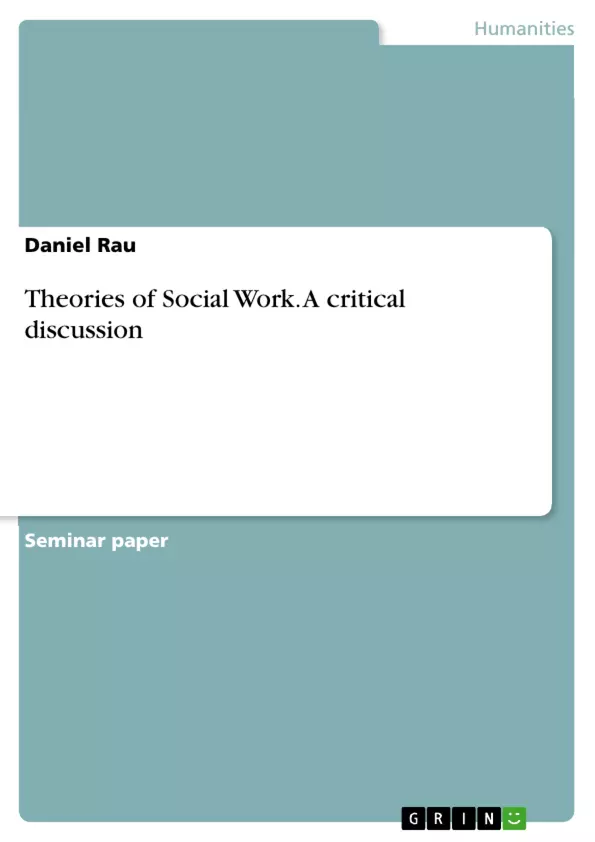The aim of this paper is to critically discuss various theories of social work in the context of a case study from the field of family support.
Three approaches are used to analyse the case and then critically discussed. In this context, it seemed appropriate to choose a classical theory from the origins of social work. The approach of Alice Salomon, who can be regarded as a pioneer of the science of social work, serves this purpose. Complementing this, two important contemporary theories are also applied. The concept of "coping with life" by Lothar Böhnisch and the approach of "lifeworld orientation" by Hans Thiersch. These two theories were chosen because of their immense, structure-forming influence on social work.
The framework of this work does not allow for the inclusion of other theories, which is why Silvia Staub-Bernasconi's systemic theory, for example, which undisputedly has a formative character in current theoretical discourses, is not applied in this work.
Inhaltsverzeichnis (Table of Contents)
- Introduction
- List of abbreviations
- Structure of the paper
- The theory/practice relationship
- Case history
- Presentation of the case
- Reflection on the history of the case
- The Social Work Theory by Alice Salamon
- Outlines of Alice Salomon's theoretical approach
- Case analysis with reference to Alice Salomon's theory
- Critical discussion of Alice Salomon's theory
- The concept of "coping with life"
- Basics of the concept "coping with life"
- Case analysis with reference to the concept of "coping with life"
- Critical discussion of the concept of "coping with life"
- Life-world oriented social work
- Basics of the theory "life world orientation"
- Case analysis with reference to life-world-oriented social work
- Critical discussion of the theory "life world orientation"
- Concluding remarks
Zielsetzung und Themenschwerpunkte (Objectives and Key Themes)
This seminar paper aims to critically discuss various social work theories in the context of a case history from the field of family assistance. The paper analyzes the case through three theoretical approaches: Alice Salomon's theory, Lothar Böhnisch's concept of "coping with life", and Hans Thiersch's approach of "life-world orientation".
- The relationship between social work theory and practice.
- The application and critical evaluation of classical and contemporary social work theories.
- The analysis of a case history from the field of family assistance through different theoretical lenses.
- The exploration of the concepts of "coping with life" and "life-world orientation" in social work.
- The contribution of these theories to understanding and addressing social work challenges.
Zusammenfassung der Kapitel (Chapter Summaries)
The paper begins by introducing the concept of the theory/practice relationship in social work, highlighting the importance of both theoretical understanding and practical application. The case history is then presented, followed by a reflection on its different aspects. The paper subsequently explores three theoretical approaches: Alice Salomon's theory, the concept of "coping with life", and life-world orientation. For each theory, the paper presents its basic tenets, analyzes the case history through the lens of the theory, and critically discusses its strengths and weaknesses.
Schlüsselwörter (Keywords)
Social work theory, case history, family assistance, Alice Salomon, coping with life, life-world orientation, theory/practice relationship, critical discussion.
Frequently Asked Questions
Who was Alice Salomon in the field of social work?
Alice Salomon was a pioneer of social work science, providing classical theoretical foundations for the profession's development.
What is Hans Thiersch's "life-world orientation" approach?
It is a contemporary theory that focuses on understanding the everyday realities and subjective experiences of clients to provide appropriate support.
What does Lothar Böhnisch mean by "coping with life"?
This concept examines how individuals manage social and personal challenges and how social work can facilitate better coping mechanisms.
Why is the relationship between theory and practice important?
Theory provides the analytical framework to understand complex cases, while practice tests and refines these theories in real-world family assistance scenarios.
Why was Silvia Staub-Bernasconi's theory excluded?
Due to the limited scope of the paper, only three theories could be applied, although systemic theories are acknowledged as highly influential.
- Quote paper
- Daniel Rau (Author), 2011, Theories of Social Work. A critical discussion, Munich, GRIN Verlag, https://www.grin.com/document/1157392



